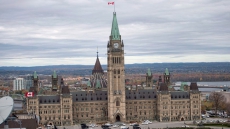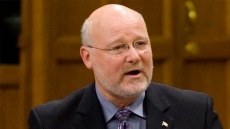VICTORIA — There is easy agreement between First Nations and the British Columbia and federal governments that treaty negotiations are languishing, expensive and fraught with obstacles, but all sides have completely different views on how to solve the trouble.
The agony and ecstasy of the maligned and saluted treaty process was on full display last week when hundreds of cheering people witnessed the signing of an agreement-in-principle on a southern Vancouver Island treaty after 20 years of talks.
Premier Christy Clark's Liberals refused to appoint former provincial cabinet minister George Abbott as the new chief of the B.C. Treaty Commission — the overseer of the federal, provincial and First Nations negotiation process — suggesting changes must be made.
Federal Aboriginal Affairs Minister Bernard Valcourt is digesting a report from federal envoy Doug Eyford that recommends Ottawa approach treaties with a sense of urgency and consider which talks are progressing and which should be dumped.
B.C.'s First Nations Summit, the province's largest aboriginal organization, wants Ottawa and B.C. treaty negotiators to come to the table with the power to make decisions rather than being forced to retreat to back rooms for approval of every move.
That convoluted plot line was evident at the signing ceremony Thursday when drums pounded, singers chanted and chiefs choked back tears as they honoured the commitment and sacrifice of leaders who spent years at negotiating tables.
Songhees First Nation Chief Ron Sam described himself as somewhat of a treaty-table rookie, devoting only six years to negotiations. Twenty years to reach a deal is too long, said Sam.
"These are good faith negotiations, so I think there needs to be some recognition of everybody's role in the whole process and not have it bogged down in political aspects," he said.
First Nations Summit spokeswoman Cheryl Casimer said moves are underway to get the three sides to meet later this month. First Nations will tell the governments they need to pick up their pace if they want to speed up treaty settlements, she said.
"Get some real negotiators," said Casimer. "Get some real mandates. If we had that at the table we would have far more agreements in place than we have today."
Four treaties have resulted from the modern-day treaty process that was launched in 1993.
British Columbia is the only province that didn't sign treaties with most of its more than 200 First Nations. A handful of bands signed agreements through the so-called Douglas Treaties in the mid-1800s.
"We can't keep people waiting," said Casimer. "We're talking about peoples lives here."
B.C. Aboriginal Relations Minister John Rustad said the current treaty process is in need of an overhaul where deals no longer take decades to achieve.
"I think each side has to look in the mirror a little bit in terms of how they've contributed to this not being successful," he said. "It's something all parties need to be thinking about in terms of how we build whatever process will be going forward."
Rustad said B.C. has achieved success with a stepping-stone approach to treaty making that involves reaching a series of smaller economic and land agreements that could eventually set the stage for final treaties.
"I believe a process to reach long-term reconciliation can be founded in that type of approach," he said.
MP Mark Strahl, Valcourt's parliamentary secretary, said his government plans to consult widely among First Nations about Eyford's report, but he suggested the federal government isn't about to make immediate changes to the process.
"Certainly Mr. Eyford has identified some concerns," said Strahl who attended the Island treaty ceremony. "We realize there are obstacles to the process but this is a reminder that through patient negotiation we can achieve these milestones."


